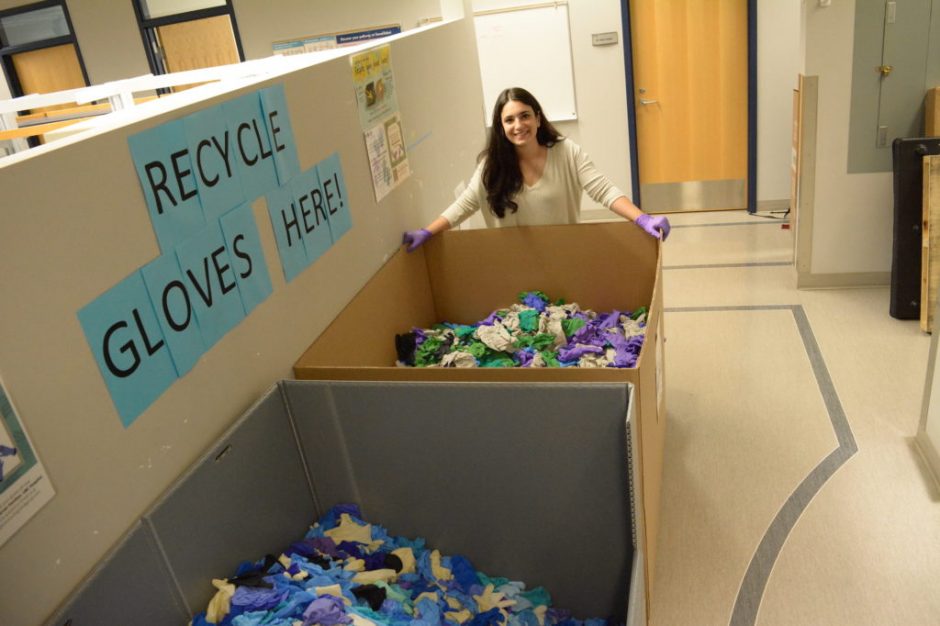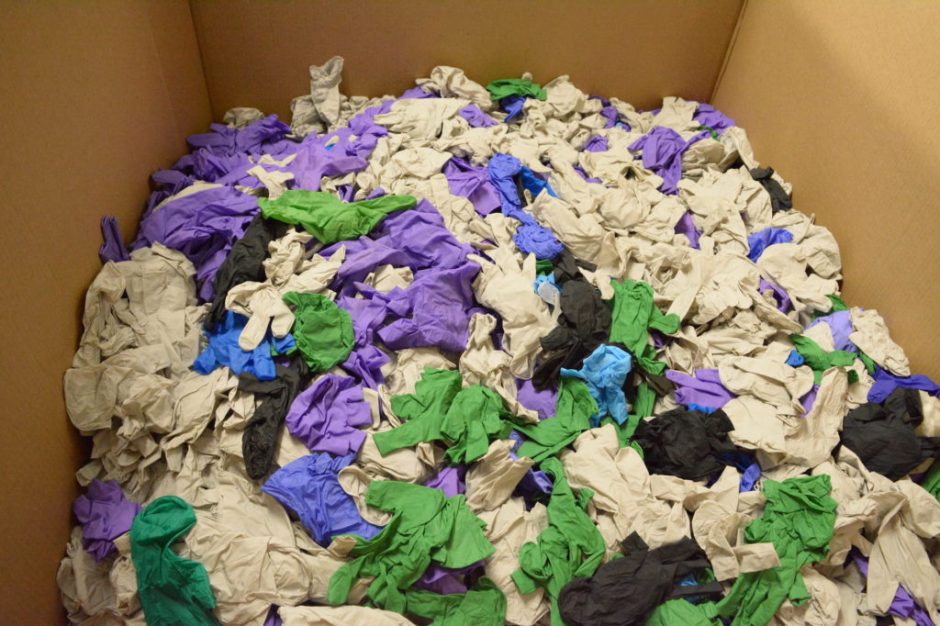
Melody Salehzadeh at the Djavad Mowafaghian Centre for Brain Health. Credit: UBC Media Relations
Melody Salehzadeh’s project to combat plastic waste has collected roughly 48,700 gloves, diverting 146.1 kilograms of waste from landfills this year.
Melody Salehzadeh, a doctoral student in the department of zoology and a graduate student in the Soma Lab, first noticed just how much plastic waste her work created during the COVID-19 pandemic. Due to restrictions, custodial staff weren’t able to enter her lab in the Djavad Mowafaghian Centre for Brain Health (DMCBH) as frequently as usual. Single-use nitrile and latex gloves were piling up in the rubbish.
“I knew it was possible to recycle the gloves, it was just a matter of someone putting in the effort,” Salehzadeh says.
Last September, the AMS Sustainability Project and the UBC Student Environment Centre awarded Salehzadeh and her team of seven other students funding to buy two giant pallets for collecting the gloves: one for all brands, currently recycled through Vitacore in Burnaby at roughly $800 per pallet, and one for Kimberly-Clark gloves, shipped to the U.S. for about $250 per pallet.
The team launched a competition in October to encourage other labs to take part in the initiative and see who could collect the most gloves. Seventeen labs took part, with the winning Ciernia lab collecting 19 kilograms of gloves.

A portion of the 48,700 gloves. Credit: UBC Media Relations
“Everyone was really excited and kept saying ‘Finally!’ The DMCBH community really came together and jumped on this opportunity to make a positive impact and reduce lab waste,” says Salehzadeh.
The gloves are recycled into plastic pellets used for building and construction supplies. Some may even see life again as lawn furniture or plastic planters through the Kimberly-Clark program. No biohazardous gloves are collected.
Gloves will continue to be collected until the pallets are full and ready to be shipped, likely in December. The initiative will continue indefinitely thanks to ongoing funding by DMCBH.
“We’re hoping to see this kind of recycling spread not just around UBC, but to other institutions and organizations in BC,” says Salehzadeh.
Teamwork makes the green work
Salehzadeh isn’t the only one working to ‘green’ the gloves on campus. Many staff members have also launched recycling initiatives.
When Diana Carlsen heard about the DMCBH project in 2021, the senior operations manager in the UBC Centre for Disease Modelling (CDM) and the Modified Barrier Facility launched her own. Initially the facilities collected gloves only, but working with Gordon Gray, senior operations manager at the Centre for Comparative Medicine (CCM), the three facilities this year began to collect all personal protective equipment to recycle—everything from gloves to masks, shoe covers and hair bouffants.
Any items that could be contaminated are disposed of safely, says Carlsen.
Gray was involved with an original glove recycling pilot at UBC in 2020, and despite a slight drop during the pandemic, has continued recycling gloves ever since. His facility expects to send three pallets, or about 136 kilograms of gloves, for recycling in September.
And the response from those in the labs has been positive, says Carlsen: “They’re super happy. Staff took it upon themselves to create their own collection boxes and bags.”
Meanwhile, research associate Dr. Reinhild Kappelhoff at the Centre for Blood Research learned about CDM’s glove recycling initiative. She applied and received funding from the UBC Sustainability Coordinator program for a pilot project for combined mask and glove recycling. From March to May of this year, 15 kilograms of material was collected to be recycled. After a one-week trial, the recycling project was rolled out to all four research floors of the Life Sciences Institute.
Having been a member of UBC’s Green Labs for more than a decade, Dr. Kappelhoff recycles as much as she can. Building occupants have been happy with the initiative. As for the future, she says, “Melody and I have big plans to get other labs and buildings involved.”